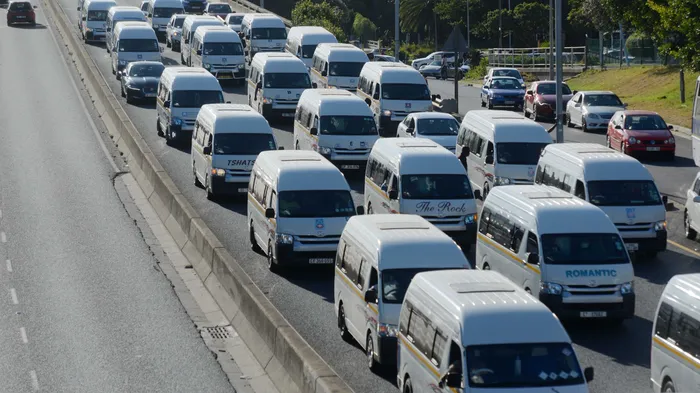
The Western Cape Government has closed off contentious routes for 30 days after a deadly dispute between Cata and Codeta.
Image: Armand Hough /Independent Newspapers
SEVERAL minibus taxi routes and ranks in Khayelitsha, Mfuleni, Lwandle, Nomzamo, and Somerset West, will be closed from Wednesday, following weeks of deadly clashes between rival associations Cape Amalgamated Taxi Association (Cata) and the Cape Organisation for the Democratic Taxi Association (Codeta).
Mobility MEC Isaac Sileku said the decision, taken at a provincial Cabinet meeting on Friday, was “exceptionally difficult” but necessary to protect lives after repeated negotiations failed to resolve the impasse.
“Following careful consideration and a decision taken at Cabinet, the Western Cape Government has resolved to invoke Section 91 of the National Land Transport Act,” Sileku said.
“This empowers us to impose extraordinary measures in areas where violence, unrest, and instability in the public transport sector have placed lives at risk.”
From Wednesday, the following routes will be closed for 30 days:
Sileku said the 30 days could be pushed if the two associations don't find a resolution.
Specified lanes at taxi ranks in Khayelitsha, Makhaza, Mfuleni, Somerset West, Nomzamo, and Lwandle will also be shut.
Sileku said: “We are acutely aware that these routes serve thousands of residents who depend on them daily. However, given the escalating violence, the tragic and unnecessary loss of life, and the failure of previous interventions to restore calm, these extraordinary measures are necessary to stabilise the situation, protect commuters, and prevent further violence.”
Violence on the contested routes has already left at least seven people dead in recent weeks, including six people killed between August 23 and 26, and the fatal shooting of an off-duty police officer and taxi operator on September 4.
“To ensure mobility during this period, alternative transport arrangements have been made,” Sileku added. “Golden Arrow Bus Services and Metrorail trains will provide additional capacity to assist residents in getting to work and learners in getting to school, especially during this crucial school exam period.”
He said authorities, including Saps, the City’s law enforcement and provincial traffic officials will monitor the ranks and affected routes.
“Visible policing will be in place on all affected routes and at ranks to protect commuters and prevent illegal operations,” Sileku said.
Western Cape Police Commissioner Lieutenant-General Thembisile Patekile stressed that safety remained the top priority.
“The decision was taken on short notice, but it allows us a few days to mitigate the risks linked to the ongoing conflict. Our foremost concern is the safety of commuters, the safety of other road users, and the well-being of operators,” Patekile said.
“While this comes with a number of exceptional challenges, directives have been issued to all affected parties. We expect them to conduct themselves responsibly and in a way that does not infringe on the rights of others. As the SAPS, we will not hesitate to take decisive action against those who defy the law.”
Cata said they expected the decision.
“This happens every time we have a conflict. It is quite sad because it will not only affect us financially, but also the commuters. That doesn’t mean operations should stop. This should be a lesson to all of us that when we have issues, we should quickly resolve them before we get into this kind of situation.”
Codeta said it was deeply concerned about the impact of the decision.
“It is important to note that as an association, we do not condone violence as a way to resolve disputes, and we particularly condemn it in all forms,” Codeta said.
The association said the core issue was the government’s refusal to issue return permits from Somerset West to Khayelitsha, leaving Codeta to carry passengers one way and Cata the other.
“This has detrimental implications not only on the patrons themselves, as they have to pay more and take multiple taxis from work to their homes, but also to the associations, as it creates friction between the two associations. All that is needed is for the government to issue permits with returns from the township to the town. This will ensure that each association carries its passengers to town and back to its township, with no overlap on another association’s route.”
Codeta added: “We commit to participate in further negotiations regarding this issue; however, we have instructed our legal team to study the publications and advise on any legal recourse available to us.”
Meanwhile, ANC Mobility spokesperson and SACP provincial secretary Benson Ngentsu expressed concern about the closures.
“The closures, if they happen, could escalate violence in the minibus industry. We are hopeful that the negotiations currently under way will be expedited and will certainly yield good results as closures of ranks and routes will harm and will not help either our people or the industry,” Ngentsu said.
He added that the ANC caucus had established a task team, led by former police and community safety MEC Leonard Ramatlakane, to mediate the impasse.
“The work done by the team thus far in engaging with various stakeholders in the sector is commendable, and we’re confident an amicable solution will be found before Wednesday.”
Related Topics: